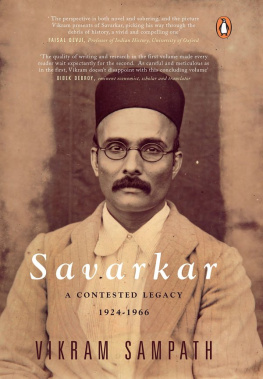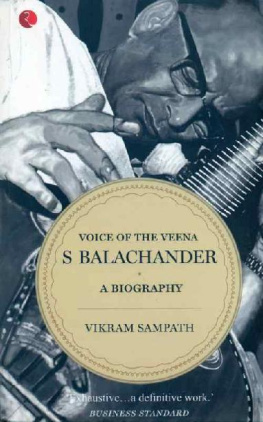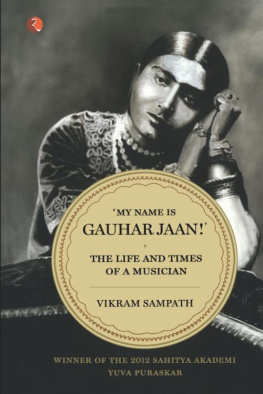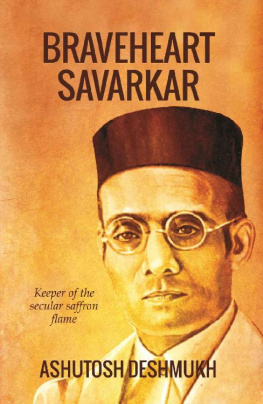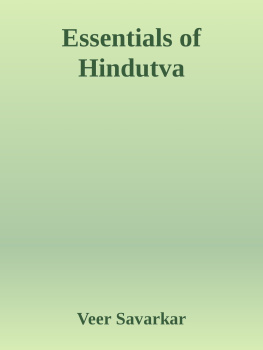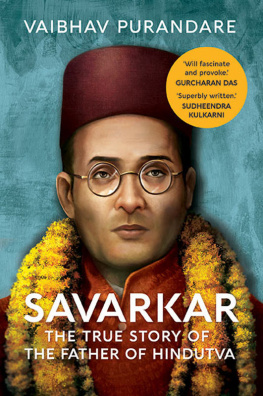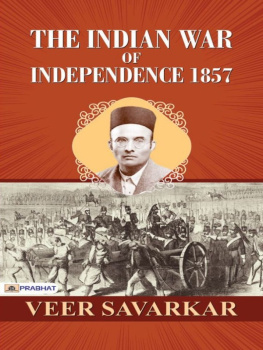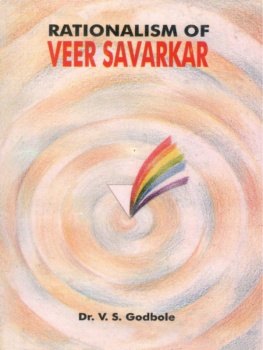Advance Praise for the Book
In the concluding volume of his path-breaking biography, Vikram Sampath shows us the world-shaping events culminating in the independence and partition of India through Savarkars eyes. The perspective is both novel and sobering, and the picture he presents of Savarkar picking his way through the debris of history a vivid and compelling oneFaisal Devji, professor of Indian history, University of Oxford
The mere mention of Vinayak Damodar Savarkar raises blood pressures, even today. To be better informed about the man, his times and his legacy, there is only one biographer one can think of. That happens to be Vikram Sampath. The quality of writing and research in the first volume made every reader wait expectantly for the second. As careful and meticulous as in the first, Vikram doesnt disappoint with this concluding volumeBibek Debroy, eminent economist, scholar and translator
Vikram Sampaths Savarkar is a major achievement. Rooted in wide-ranging research, but also very easy to read, it brings to life the world and the ideas of a revolutionary Hindu who did much to shape modern IndiaFrancis Robinson, professor of the history of South Asia, Royal Holloway, University of London
Vikram Sampath has now completed his monumental biography of Vinayak Damodar Savarkar. His mastery over the sources, his painstaking effort to bring balance to the narrative and the extent of his coverage of the praise and the criticism of Savarkar by other people make this one of the best biographies of any of the political giants of the first generation of freedom fighters. Given that Savarkar has been excommunicated from Indias history for his alleged involvement in the assassination of Mahatma Gandhi, I particularly commend his chapter on the Gandhi assassination story. Of the many accounts I have read over the years, this is the most thorough. Whatever your political views, read this book as a fine piece of historical writingMeghnad Desai, eminent author and columnist, professor emeritus at the London School of Economics
Savarkar is an extremely controversial figure whose legacy is considered troubled by many but inspiring by many others. This makes him an appropriate subject for deeper study. Vikram Sampath has already written one highly readable book on him and this is his second volume. By examining Savarkars own writings and actions as well as those of his contemporaries and by admirable archival research, Sampath succeeds in presenting Savarkar in all his contradictions. Sympathetic but not apologetic, this is a work of considerable scholarship, something difficult to achieve in India as far as writing about public personalities is concerned. My endorsement of Sampaths fine book is as a student of Indian political history and not as someone still in active politics who believes that Savarkar is a profoundly divisive figure and the very opposite of what Mahatma Gandhi lived forand ultimately killed for as well. Jairam Ramesh, former union minister and author
The two-volume series titled Savarkar: Echoes from a Forgotten Past on the life of Veer Savarkar is a valuable addition by Vikram Sampath to existing literature. It documents the contributions of one of the greatest heroes of Indias struggle for Independence. Savarkars life is an epitome of the extent to which a mans will can determine his life. Despite enduring unconscionable sufferings at the hands of the colonial masters his zeal to fight for the independence of his motherland did not get hindered. His contributions in shaping the India of today are cross-sectoral. From social issues to cultural, Savarkars imprints are omni-present. I congratulate Vikram on having documented the various aspects of Savarkars life as a political activist, thinker, and an orator while also touching on the lesser-known aspects of being a poet, writer, and playwright. I am sanguine that this work will go a long way in introducing Indians to the much-forgotten hero of Indias struggle for IndependenceRam Madhav, former national general secretary of BJP, member of National Executive Committee, RSS
This is a fitting sequel to what I consider the best biography ever written by an Indian writer. This volume by Vikram brings alive the complex story of Savarkar after Kala Panihis transformation from fiery revolutionary to social worker, his role in creating a modern political consciousness among Hindusand provides the background to debates that continue in 21st century IndiaSanjeev Sanyal, writer and economist
Vikram Sampaths two-volume series, Savarkar, is not limited to providing mere biographical details of the life of Savarkar but offers historical context through providing detailed descriptions of historical events of that era. Thus, Savarkar makes dual contribution to Indian history. The author staggers Savarkars biography with details of sinister British rule in India, which incidentally gave rise to powerful nationalist leaders of multiple stripes during the early phase of the Indian independence movement.
Savarkar fulfills the long overdue need for an authentic historical biography of the brave son of India. The book examines the life of Savarkar closely, while also providing lesser-known details, which help dispel the many mythical accounts surrounding Savarkars life. As a corollary, this series also supplements our existing patchwork of knowledge on the history of Indian independence.
The series is a historiographical work, while simultaneously serving as a biographical book on one of the most misunderstood nationalists of India. This series brings forward for the first time an authoritative examination of documents (letters, speeches, official communication, newspaper reports) as well as numerous never-before-studied documents.
The first volume begins rightfully with the birth of Savarkar along with the events of his childhood and young-adult life, which are captured in the first few chapters interspersed with thought-provoking details of the political circumstances of India. Through the depiction of successive struggles of young Savarkar in plague-affected western India between 18991900, the author realistically demonstrates the struggles of average Indians under British rule. With Savarkars move to Nasik from 1900 onwards, his nationalist activities gained momentum as he founded Mitramela (also its affiliate Rashtrabhaktasamaja). Savarkars activities and entanglements with national movement here increasingly pitted him against the British authorities, and at times brought him in opposition to established national leaders, including Tilak. Crucial is Savarkars decision to champion the celebration of Shivaji Utsav as national mela during this early phase. Savarkars brilliant speeches inspired numerous young nationalist leaders, while the British government used these speeches to prosecute him on charges of sedition many years later. Of utmost interest are the chapters discussing the life of Savarkar in London (including his short stint in Paris) followed by his imprisonment in Andamans and later in India.

